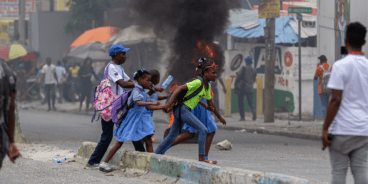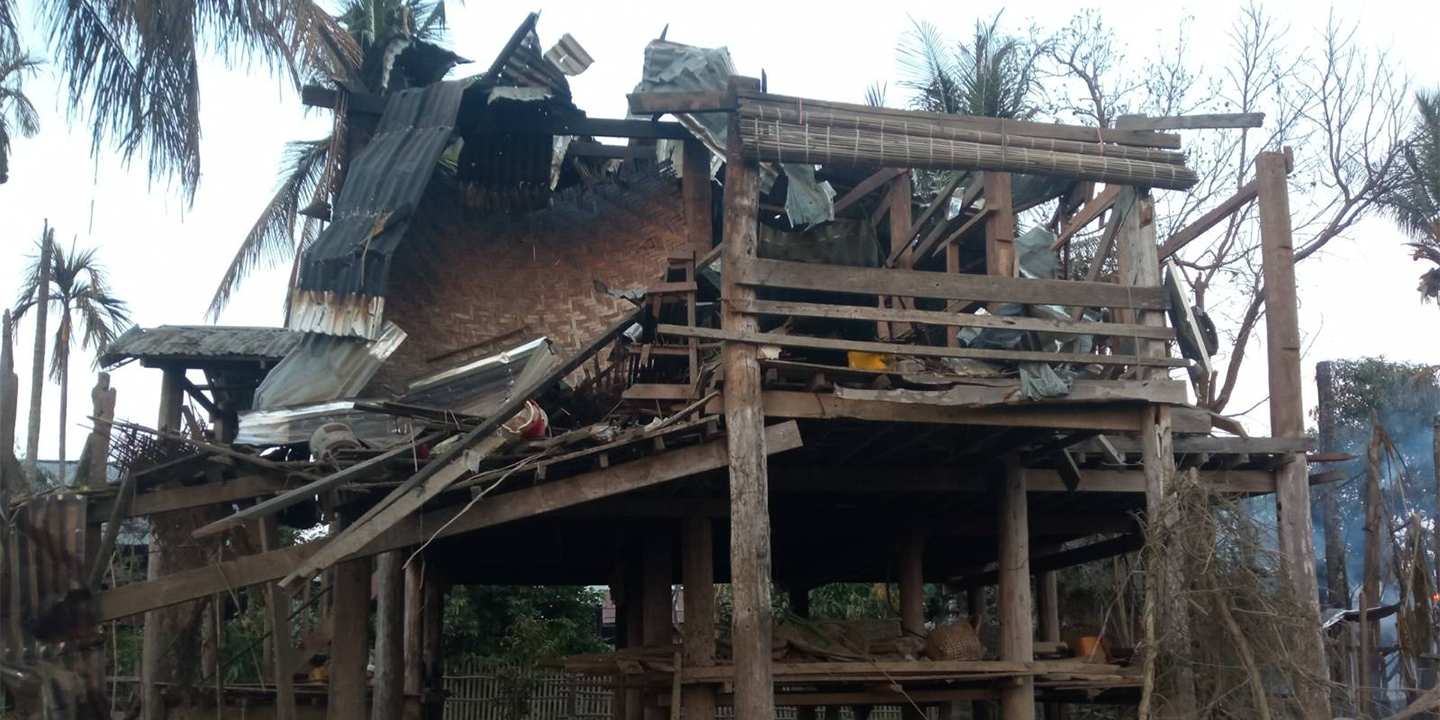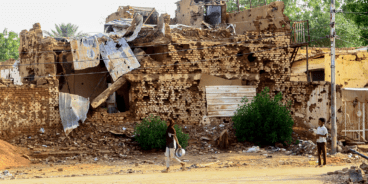

Atrocity Alert No. 332: Myanmar (Burma), International Holocaust Remembrance Day and Venezuela
Atrocity Alert is a weekly publication by the Global Centre for the Responsibility to Protect highlighting situations where populations are at risk of, or are enduring, mass atrocity crimes.
MYANMAR MILITARY CONTINUES ASSAULT ON SAGAING, DISPLACING THOUSANDS OF CIVILIANS
In recent days Myanmar’s (Burma) military has continued to launch airstrikes and raids throughout the resistance stronghold of Sagaing Region in northern Myanmar, perpetrating likely war crimes and crimes against humanity. Following three days of intense clashes with local resistance groups and airstrikes on civilian targets, between 22-23 January junta forces burned houses in Moetar village, Katha Township. More than 15,000 residents from 10 villages across Katha Township fled their homes as a result of the attacks. Over 7,000 civilians were also forced to flee on 23-24 January after military soldiers raided and torched villages along the border of Depayin and Ye-U townships in Sagaing Region.
Myanmar’s military – the Tatmadaw – has consistently perpetrated airstrikes and raids in the nearly two years since the coup in order to invoke terror, maintain control and quell dissent. In December 2022 junta soldiers conducted arson attacks on 30 villages in Depayin Township alone, destroying over 3,000 houses and five monasteries. According to the independent rights group Data for Myanmar, junta forces had burned an estimated 36,500 houses in Sagaing Region as of December. In a statement during December, Tom Andrews, the UN Special Rapporteur on the situation of human rights in Myanmar, said, “The systematic gross human rights violations — amounting to war crimes and crimes against humanity — being perpetrated daily on the people of Myanmar by an illegal military junta requires strong, coordinated action… and accountability for crimes the military has committed to date.”
As the airstrikes and raids against Sagaing continue, civil society has recently taken an important step to advance justice and accountability for the military’s past and current atrocities. On 24 January human rights group Fortify Rights and 16 people from Myanmar filed a criminal complaint in Germany under the principle of universal jurisdiction against Myanmar’s military generals and others. The complaint accuses the Tatmadaw of committing genocide, war crimes and crimes against humanity during its so-called “clearance operations” against the Rohingya in 2017 and since the coup.
August 2022 marked the five-year anniversary of the clearance operations against the Rohingya, and 1 February will mark the second anniversary of the deadly coup. Liam Scott, Myanmar expert at the Global Centre for the Responsibility to Protect, said, “Although there are a series of ongoing accountability initiatives and mechanisms, the military has enjoyed impunity for its atrocities for too long. This lack of accountability has emboldened the military to continue perpetrating abuses throughout Myanmar, such as the scorched earth campaign and airstrikes in Sagaing. It is time to ensure that the victims and survivors receive the justice they deserve.” German authorities should take up the complaint and open an investigation to help ensure that those responsible for these grave crimes are held to account.
INTERNATIONAL HOLOCAUST REMEMBRANCE DAY
On Friday, 27 January, the international community will commemorate International Holocaust Remembrance Day, honoring the millions of victims of the Holocaust, and the 78th anniversary of the liberation of the Auschwitz-Birkenau concentration camp. The systematic persecution and extermination of more than six million Jews, including more than a million murdered within the confines of Auschwitz, remains one of the darkest chapters in human history.
In addition to commemorating victims, International Holocaust Remembrance Day also recognizes the role of educational programs in teaching about the Holocaust in order to educate future generations on the tools to prevent genocides. This year’s theme, “Home and Belonging,” highlights the humanity of Holocaust victims and survivors, as well as the dangers of hate speech, antisemitism, Holocaust distortion and denial and prejudice. In recent years the hatred and antisemitism that begat the Holocaust is experiencing a resurgence around the world, with a worrying rise in neo-Nazism, hate speech and Holocaust denial. Despite the Holocaust being one of the most well documented mass atrocities in history, Holocaust denial and distortion has been amplified on social media platforms with ease.
By systematically negating the facts of history, genocide deniers manufacture doubt, seed discord and mistrust, strengthen contested narratives about the past, present and future, and create conditions that may lead to the recurrence of atrocities. Genocide denial is not only an attempt to minimize or redefine the scale and severity of the crimes committed, but it also often contributes to the dehumanization of survivors and victims.
Savita Pawnday, Executive Director of the Global Centre for the Responsibility to Protect, said, “On this International Holocaust Remembrance Day, the Global Centre stands with and honors all of the victims of the Holocaust and of Nazism. Auschwitz-Birkenau is a warning from history of the consequences of indifference and inaction in the face of mass atrocities. If we do not resist those who deny the humanity of others, we risk repeating the horrors of the past.”
As history has taught us, genocide does not happen overnight. Genocide is preventable if warning signs – such as hate speech and systemic discrimination and marginalization – are taken seriously and followed by early action. Member states should institute education curriculums that inculcate values and behaviors that counter hate and prejudice. States should also incorporate modules on preventing and responding to atrocity crimes in their education system, including modules on how to prevent and to resist incitement.
VENEZUELAN HUMAN RIGHTS CHAMPION FELICIANO REYNA NAMED MARTIN ENNALS LAUREATE
On 19 January Venezuelan human rights activist Feliciano Reyna Ganteaume was selected as Laureate for the prestigious Martin Ennals Award, which honors individuals and organizations who have shown exceptional commitment to defending and promoting human rights. Laureates are selected by a jury of 10 of the world’s leading human rights organizations. The jury also selected Delphine Djiraibé from Chad and Khurram Parvez from Kashmir for the 2023 Award, emphasizing that each Laureate has “dedicated over 30 years of their lives to building movements which brought about justice for victims or delivered medicines to the marginalized.”
In 1995 Reyna founded Acción Solidaria – an organization pioneering the provision of medication and treatment to Venezuelans living with HIV/AIDS. Since then, he has worked tirelessly as a highly respected human rights activist and has been at the forefront of efforts to respond to the ongoing multidimensional crisis in Venezuela, which has led more than 7 million people to leave the country since 2014. Reyna, together with a large coalition of Venezuelan human rights defenders, has been instrumental in mobilizing the UN Human Rights Council to establish an independent investigative mechanism into alleged crimes against humanity in Venezuela. Elisabeth Pramendorfer, Venezuela expert and Geneva Representative of the Global Centre for the Responsibility to Protect, emphasized that, “The overwhelming celebration to this announcement is a testament to Feliciano’s legacy, integrity and his impact on vulnerable communities in Venezuela. The jury’s decision also honors civil society organizations across Venezuela that have emerged as the primary actors in providing humanitarian assistance and supporting victims of state-led violence.”
The announcement comes at a time when human rights defenders in Venezuela continue to face systematic repression by the government. In February 2021 the Global Centre joined 11 international organizations in condemning the targeted harassment, reprisals and restrictions against Venezuelan civil society partners. Since then, the government has continued its crackdown on civic space. In a preliminary discussion on 24 January, the Venezuelan National Assembly provisionally approved draft legislation aimed at restricting international support – and essentially criminalizing – the work of civil society organizations. At the time of writing, Javier Tarazona, Director of the Venezuelan human rights group FundaRedes, has spent 573 days in arbitrary detention for documenting egregious abuses along Venezuela’s border areas.
The Global Centre honors the three Martin Ennals Laureates, whose recognition highlights the tireless work of human rights defenders around the world who fight for the rights of victims often at immense personal risk. We call on all states and UN bodies and agencies to actively support and protect human rights defenders and civil society organizations, as well as promote safe and open civic space.
Related Content


Atrocity Alert No. 432: Sudan, Venezuela and Haiti
